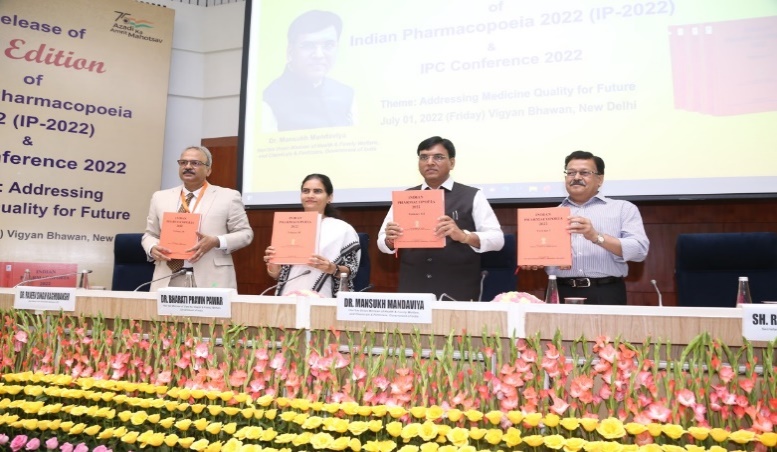- Visibility 148 Views
- Downloads 5 Downloads
- DOI 10.18231/j.jeths.2023.015
-
CrossMark
- Citation
The exploring role and responsibility of Indian pharmacopoeia commission: An introduction
Introduction
Indian Pharmacopoeia Commission (IPC) functions as to update regularly the standards of drugs commonly required for treatment of diseases prevailing in India.[1] IP is published by IPC for improving Quality of Medicines by way of adding new and updating existing monographs. It further promotes rational use of generic medicines by publishing National Formulary of India (NFI). IP prescribes standards for identity, purity and strength of drugs essentially required from health care perspective of human beings and animals.[2] IPC also provides IP Reference Substances (IPRS) which act as a finger print for identification of an article under test and its purity as prescribed in the Indian Pharmacopoeia. IPC also functions as WHO collaborative centre for Pharmacovigilance in Public Health Programmes and regulatory services as well as Materiovigilance Programme of India (MvPI) in India.
About the Indian Pharmacopoeia (IP)
Indian Pharmacopoeia (IP) is book of standards for drugs which is published by the Indian Pharmacopoeia Commission (IPC) on behalf of the Ministry of Health & Family Welfare, Government of India in fulfilment of the requirements of the Drugs and Cosmetics Act, 1940 and Rules 1945 thereunder. The standards of the IP are authoritative in nature and are enforced by the regulatory authorities for ensuring the quality of drugs in India. Recently the Indian Pharmacopoeia has been recognized formally by the National Department of Regulation of Medicines and Health Products of the Ministry of Public Health of Islamic Republic of Afghanistan and also will be used based on the requirement as reputable pharmacopoeia in the laboratory of medicines and health products quality. With this, a new beginning has been made as Afghanistan has become the first country to recognize the IP, pursuant to the efforts of the Ministry of Health & Family Welfare and the Ministry of Commerce.[3]
Release of Indian Pharmacopoeia 2022 (IP 2022)
In a bid to promote the highest standards of drugs in the country, the Indian Pharmacopoeia Commission (IPC) has published Indian Pharmacopoeia 2022.[4], [5] The honourable Union Minister of Health and Family Welfare, Govt. of India, Dr. Mansukh Mandaviya, released the Ninth Edition of Indian Pharmacopoeia (IP) 2022 on 01st July, 2022 at Vigyan Bhawan, New Delhi.[6] Dr. Mansukh Mandaviya highlighted the role of Indian Government at international level and said that world has started recognising Indian Pharmacopoeia and giving importance towards accepting it. India can take advantage of this focus on international trade and industries based on our strength in indigenous medicines. Indian Pharmacopoeia is important to develop a Swasthya and Samrudh Bharat, to maintain standard quality of our medical products- vaccines, medicines, equipment etc. and to keep an eye on the effect of these medicines on patients.”[6], [7]

Salient features of IP 2022[8]
Indian Pharmacopoeia 2022 contains a total of 92 new monographs including 60 Chemical and other products as follows:
New Monographs: 92
APIs: 27
Dosage Forms (Chemicals): 33
Vitamins, Minerals, Amino acids, Fatty Acids etc.: 21
Biotechnology Derived Therapeutic products: 03
Herbs & Herbal Products: 02
Phytopharmaceutical Ingredient: 7
Blood & Blood Related Products: 02
Vaccines and Immunosera for human use: 04
New General Chapters: 12
Authentic copies of the Indian Pharmacopoeia 2022, is now available for purchase to its stakeholders/end users from the facility located at Ghaziabad. All the stakeholders/end user can order their copy via the direct link on the website www.ipc.gov.in
Link: http://ipc.gov.in/shop/index.php?route=product/product&path=59&product_id=1075
National Formulary of India
The National Formulary of India (NFI) is the reference book for selection and rational use of medicines. It is a guidance document for medical practitioners, pharmacists, nurses, medical & pharmacy students, other healthcare professionals and stakeholders in the health-care system. The NFI represents a broad consensus of medical opinion with respect to drugs and their formulations. It provides the physician with carefully selected therapeutic agents of proved effectiveness which form the basis of rational drug therapy.



Journey of the Indian Pharmacopoeia
Indian Pharmacopoeia had a long journey of its existence. After independence, the Indian Pharmacopoeia Committee was constituted in 1948, for publication of IP as its main function. The Indian Pharmacopoeia main editions are as follows:

Functions of Indian Pharmacopoeia Commission
The Indian Pharmacopoeia Commission (IPC) deals with the matters relating to timely publication of the Indian Pharmacopoeia comprising updated drugs monographs used to strengthen the drugs imported, manufactured for sale, stocked or exhibited for sale or distributed in India. Apart from the publication IPC the pharmacopoeial functions are driven by collaborations with the pharmaceutical manufactures, drug testing laboratories, drug regulatory authorities, research institutions, academia and public health.[9]
The major functions of IPC are as follows:
The Indian Pharmacopoeia Commission (IPC) works to keep abreast the stakeholders of new scientific developments in the area of setting standards of drugs, promoting rational use of medicinal products through generic approach and to ensure patient safety, their rights and well-being through Pharmacovigilance Programme of India (PvPI) and Meteriovigilance Programme of India (MvPI).
Publication of the Indian Pharmacopoeia and its addenda at regular intervals, Indian Pharmacopoeia (IP) functions to strengthen the quality of drugs in India as well as pan India countries.
Publishing National formulary of India (NFI) for rational use of medicines by healthcare professionals.
Preparation, certification and distribution of IP Reference Substances (IPRS) to the stakeholders and training on Pharmacopoeial issues.
Analysis of the New Drugs Substances by Indian Pharmacopoeia Commission for their marketing authorization.
Development of IP Reference Substances (IPRS) or Reference Standards and comprehensive list is available on the website of IPC (www.ipc.gov.in).
During crisis of Covid-19 pandemic, IPC kept it services extended to its stakeholders in above mentioned areas.
Skill development and International collaborations etc.
Skill Development at IP Commission
IPC contributes significantly to the skill development of professionals engaged in the quality, safety and rational use of medicines. IPC laboratories are equipped with the latest analytical instruments and equipment and has qualified, experienced and competent scientists are engaged for providing training on a regular basis to the drug analysts/bench chemists, regulatory officials, pharmaceutical and medical academicians, research scholars, students, industry personnel etc.
Pharmacovigilance Programme of India[10]
Pharmacovigilance Programme of India (PvPI) is Government of India’s flagship drug safety monitoring programme which collates and analyses drug-related adverse events. Ministry of Health and Family Welfare, Government of India recasted this programme on 15th April 2011 resulting in shifting PvPI from All India Institute of Medical Sciences (AIIMS), New Delhi to Indian Pharmacopoeia Commission (IPC), Ghaziabad. Since then, IPC has been entrusted with the responsibility as the National Coordination Centre for Pharmacovigilance Programme of India (NCC-PvPI). Adverse drug reaction (ADR) is one of the leading causes of morbidity and mortality worldwide. The consequences of ADRs burden on the healthcare system are increased cost of therapy and prolongation of hospitalization. It is, therefore, imperative to monitor the safety of medicines. Provide scientific support to WHO members states/ countries participation in PIDM for PV in public health programmes and regulatory services being PvPI as Collaborating centre for WHO.
Reporting of Adverse Drug Reaction (ADR)
Pharmacovigilance Programme of India (PvPI) Helpline works with the toll free number 1800 180 3024. It has been serving as one of the reliable tools for reporting suspected adverse events. Patients/Consumers/Healthcare Professionals can report suspected adverse events due to the use of medical products/ Medical Devices with the continuous efforts of Pharmacovigilance officials posted at AMCs, the helpline facility has been excelling in India. Calls are primarily responded to in English and Hindi on all working days between 9:00 AM and 5:30 PM.
For E-Reporting “ADR PvPI” Mobile app is freely available for download from Google Play Store for reporting of Adverse Events by the Healthcare Professionals / Consumers.

Materiovigilance Programme of India (MvPI)
The Materiovigilance Programme of India (MvPI) was commenced on 10th February 2015 in an effort to ensure safety of medical devices. The objective of MvPI is to ensure the patient safety by monitoring, recording, analyzing the root cause of adverse events or risk associated with the use of medical devices and suggesting National Regulatory Authority i.e., Central Drugs Standard Control Organization (CDSCO) for appropriate action. One can use the medical device adverse event reporting form which is available on the IPC website (www.ipc.gov.in) to report any medical device associated adverse event through reporters from Medical Device Adverse Events Monitoring Centre (MDMC)/Adverse Drugs Reaction Monitoring Centre (AMC) or directly to NCC-MvPI, IPC. The MvPI has the helpline i.e., 1800-180-3024 (Monday to Friday from 09:00 AM to 5:30 PM, except holidays) to report adverse events. A person can also report through MDAE by using PvPI mobile application, which is freely available on google play store.
Conclusion
This article has brought out the prospects of efficacy and efficiency of drugs used for the treatment of diseases prevailing in this country. Indian Pharmacopoeia is the officially recognised book of standards for drugs to specify the standards of identity, purity and strengths for the drugs imported, manufactured for sale, stocked or exhibited for sale or distributed in India. Indian Pharmacopoeia Commission is a WHO pre-qualified and NABL accredited laboratory that ensures the compliance with the quality management system - ISO/IEC 17025:2005 in the field of chemical and biological testing. In line with the objectives of Skill Development, IP Commission provides hands-on training to the regulators, researchers, scientists, analysts, academicians and students in the areas related to standard setting for drugs, drug analysis, pharmacovigilance and other related areas. Furthermore, IPC promotes the rational use of generic medicines by publishing National Formulary of India (NFI) which is a guidance document essentially meant for the healthcare professionals, students, nurses and pharmacists for appropriate selection of medicines. The NFI covers the drugs based on their therapeutic merit, the extent of their use in the current medical practices. This study reflects the complete knowledge of Pharmacopoeial growth, journey and its compliance in Indian perspective.
Source of Funding
None.
Conflicts of Interest
There are no conflicts of interest.
References
- . Indian Pharmacopoeia Commission (IPC). . [Google Scholar]
- SG Suke. Indian Pharmacopoeia Commission: Structure and Role in Formulation of IP and NFI. Int Sch Sci Res Innov 2015. [Google Scholar]
- . About Indian Pharmacopoeia (IP). . [Google Scholar]
- . Composition of IPC, Annual Report 2021-22. . [Google Scholar]
- D Basu. The Role Played By The Indian Pharmacopoeia Commission In Today’s Era: A Critical Study. Voice Res 2020. [Google Scholar]
- . Dr Mansukh Mandaviya chairs Indian Pharmacopoeia Commission conference 2022 and releases 9th edition of Indian Pharmacopoeia. . [Google Scholar]
- P Thota, A Thota, M Pandey, P Sarma, B Medhi, R Sharma. A comparative study of pharmacopoeial quality standards and regulations of radiopharmaceuticals. Indian J Nucl Med 2021. [Google Scholar]
- . Salient Features of Indian Pharmacopoeia 2022. . [Google Scholar]
- V Kalaiselvan, R Kumar, GN Singh. Indian Pharmacopoeia Commission's Partners for Promoting Public Health. Adv Pharmacoepidemiol Drug Saf 2015. [Google Scholar] [Crossref]
- J Prakash, R Sachdeva, T Shrivastava, C Jayachandran, A Sahu. Adverse event reporting tools and regulatory measures in India through outcome of Pharmacovigilance Programme of India. Indian J Pharmacol 2021. [Google Scholar]
- Introduction
- About the Indian Pharmacopoeia (IP)
- Release of Indian Pharmacopoeia 2022 (IP 2022)
- National Formulary of India
- Journey of the Indian Pharmacopoeia
- Functions of Indian Pharmacopoeia Commission
- Skill Development at IP Commission
- Pharmacovigilance Programme of India[10]
- Reporting of Adverse Drug Reaction (ADR)
- Materiovigilance Programme of India (MvPI)
- Conclusion
- Source of Funding
- Conflicts of Interest
